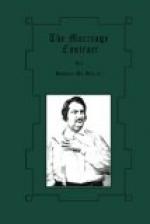Natalie kissed her mother’s hands with tears of gratitude. Like all women in whom mental emotion is never warmed by physical emotion, she suddenly comprehended the bearings of this feminine policy; but, like a spoiled child that never admits the force of reason and returns obstinately to its one desire, she came back to the charge with one of those personal arguments which the logic of a child suggests:—
“Dear mamma,” she said, “it is only a few days since you were talking of Paul’s advancement, and saying that you alone could promote it; why, then, do you suddenly turn round and abandon us to ourselves?”
“I did not then know the extent of my obligations nor the amount of my debts,” replied the mother, who would not suffer her real motive to be seen. “Besides, a year or two hence I can take up that matter again. Come, let us dress; Paul will be here soon. Be as sweet and caressing as you were,—you know?—that night when we first discussed this fatal contract; for to-day we must save the last fragments of our fortune, and I must win for you a thing to which I am superstitiously attached.”
“What is it?”
“The ‘Discreto.’”
Paul arrived about four o’clock. Though he endeavored to meet his mother-in-law with a gracious look upon his face, Madame Evangelista saw traces of the clouds which the counsels of the night and the reflections of the morning had brought there.
“Mathias has told him!” she thought, resolving to defeat the old notary’s action. “My dear son,” she said, “you left your diamonds in the drawer of the console, and I frankly confess that I would rather not see again the things that threatened to bring a cloud between us. Besides, as Monsieur Mathias said, they ought to be sold at once to meet the first payment on the estates you have purchased.”
“They are not mine,” he said. “I have given them to Natalie, and when you see them upon her you will forget the pain they caused you.”




